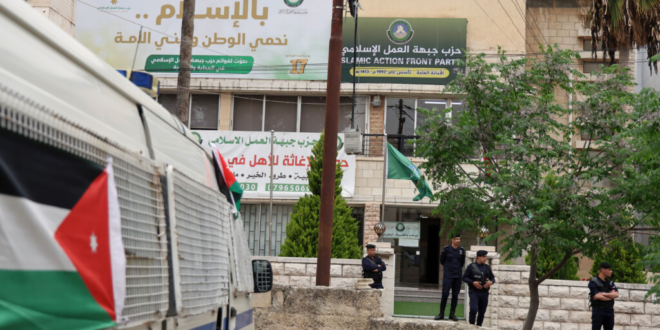“The Muslim Brotherhood and all its activities are banned.” With that declaration, Jordanian Interior Minister Mazen al-Farayya broke with decades of restraint toward the influential Islamist movement. The April 23 announcement came just days after authorities arrested 16 operatives accused of building rockets and drones, stockpiling weapons, and recruiting terrorists on Jordanian soil. Ever since the Brotherhood came out in fierce opposition to the 1994 peace treaty with Israel, tensions with the government have simmered — escalating further during the Arab Spring, the wave of protests in the Arab world that led to the overthrow of regimes in Tunisia, Egypt, Libya, and Yemen. Yet the Jordanian Brotherhood did not take part in violent episodes, unlike other branches of the movement across the region. So, Jordan stood apart from its neighbors, opting to contain rather than confront. That strategy is now in ruins.
Brotherhood Operatives Tied to Terror Plot
Jordanian intelligence has laid bare the details of a series of terrorist plots in which “members of the outlawed Muslim Brotherhood (MB) were planning on targeting sensitive sites.” In a video released by the General Intelligence Directorate (GID), several operatives confessed to direct ties with the Brotherhood. Abdullah Hisham, a member of the rocket manufacturing cell, stated, “My relationship with the Muslim Brotherhood began in 2020” but only later did it task him with manufacturing rockets. Another cell member, Muath al-Ghanem, said he “remains an active member to this day.” The rocket manufacturing cell confessed it “received $20,000 from a Brotherhood figure in Lebanon to purchase materials for rocket production.” A member of the recruitment cell confessed to enlisting Brotherhood members for terrorist activities while serving as the organization’s administrative manager in Zarqa and serving on the Brotherhood’s Shura Council, the MB’s decision-making body.
Previous Ban of Brotherhood Was Symbolic, Not Enforced
In 2020, Jordan’s highest court issued a ruling that formally dissolved the Brotherhood for failing to register as a legal entity. However, the court stopped short of banning the Brotherhood’s political arm, the Islamic Action Front (IAF), which continued to operate with legal cover. This leniency allowed the movement to remain politically active through the IAF, which won 31 out of 138 seats in the 2024 parliamentary elections, the most of any party.
In response to the government’s declaration of a ban, the IAF announced “that its leadership is independent of any other entity,” attempting to distance itself from the Muslim Brotherhood, but as the Brotherhood’s political arm, the IAF is deeply tied to the group’s operations. The Brotherhood’s Shura Council handpicks the IAF’s leadership, the IAF shares offices with the MB, and its funding flows through the Brotherhood’s financial networks.
In this instance, before the GID exposed the terror plot, the IAF had called for the release of several cell members, framing them as political prisoners. The list included two individuals from the drone unit, two from the rocket cell, and two from the recruitment cell.
Since the court’s ban did not formally include the IAF, outlawing it would likely require a separate ruling and an official decision by the Independent Electoral Commission. Nevertheless, the ban is likely to erode the IAF’s political base well before the next elections in 2028. Even if it remains a legal party, the loss of Brotherhood-linked funding could cripple its chances at the ballot box.
To Prevent Future Attacks, Security Cooperation for Jordan is Key
By outlawing the Brotherhood, Jordan risks driving the group underground — a path that led to a spike in terrorist attacks in Egypt in the 1990s. For years, Amman opted for containment to help it monitor the Brotherhood and prevent militant activity, but that strategy has failed. The danger now is a covert, radicalized network that poses a greater threat to national security. The United States should urge Jordan to deepen intelligence cooperation with Gulf allies and Israel to keep the Brotherhood in check and prevent future attacks.
 Eurasia Press & News
Eurasia Press & News




